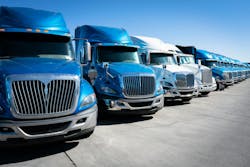If it's baseball season, it's time for another swing at the repeal of Federal Excise Tax.
The Modern, Clean, and Safe Trucks Act of 2025 was introduced in the House by a bipartisan coalition of Congressmen led by Reps. Doug LaMalfa (R-California), Chris Pappas (D-New Hampshire), Darin LaHood (R-Illinois), Salud Carbajal (D-California), and Max Miller (R-Ohio).
“First implemented over a century ago to help finance America’s effort in World War I, the FET has become the largest excise tax on any product, adding $24,000 to the cost of each new clean-diesel tractor-trailer,” said American Trucking Associations President & CEO Chris Spear. “Keeping this antiquated tax on the books imposes an enormous hardship, particularly for the small fleets, family businesses, and independent truckers who make up the overwhelming majority of trucking. Removing this burden will allow motor carriers to replace their trucks with modern, safer, and cleaner equipment, which will in turn provide a boost to manufacturing jobs. Our industry is grateful to Reps. LaMalfa, Pappas, LaHood, Carbajal, and Miller for their leadership on this issue to improve highway safety, reduce emissions, and strengthen our economy.”
The Clean Freight Coalition (CFC) likewise supports the legislation as ns incentive for carriers to refresh their fleets with cleaner and safer trucks.
“There are many pathways to reducing truck emissions, and replacing old equipment with trucks equipped with the most advanced technology provides immediate benefits for the environment, and at the same time protects the resiliency of the supply chain and guards against rising freight costs which are ultimately paid by consumers,” said CFC Executive Director Jim Mullen. “The stakeholders represented by the CFC applaud the sponsors of this bill for their efforts to improve the environment and support the trucking industry.”
The FET began in 1917 to help finance World War I. Today, it is the highest percentage federal excise tax—at 12 percent—levied on any product, amounting to a $6 billion annual burden on the trucking industry. In many cases, this exorbitant additional expense simply puts new trucks out of reach, and small businesses with less access to capital are disproportionately harmed. 96% of U.S. trucking companies are small businesses operating 10 trucks or fewer.
Keeping this tax on the books decreases orders for trucks and trailers, consequently reducing manufacturing jobs. It also delays the deployment of new trucks and trailers, which have greater environmental and safety benefits compared to older models still on the road, ATA noted in a statement.
ATA's research arm, the American Transportation Research Institute last year selected a cost-benefit analysis of FET among the top research priorities for the trucking industry.
“For over a century, the federal excise tax on heavy-duty trucks has gone from a temporary wartime measure to fund World War I, to an outdated tax that punishes truck buyers,” said Rep. LaMalfa. “This is the highest percentage-based tax Congress imposes on any product, yet it fails to be a reliable source of funding for the Highway Trust Fund. This tax forces buyers to stick with older, less efficient models and makes it harder for truckers to modernize their rigs, holding back the trucking industry from updating. Let’s repeal this outdated tax and support the men and women who keep America moving.”
NTEA—the Work Truck Association continues to call on Congress to repeal FET.
“Eliminating this tax would provide Congress the opportunity to create long-term stability in the Highway Trust Fund by replacing FET with a funding source not based on annual truck sales,” the association said in a legislative alert. NTEA maintains a webpage featuring FET repeal resources.
Look for additional coverage in the April print edition of TBB.
About the Author
Kevin Jones
Editor
Kevin has served as editor-in-chief of Trailer/Body Builders magazine since 2017—just the third editor in the magazine’s 60 years. He is also editorial director for Endeavor Business Media’s Commercial Vehicle group, which includes FleetOwner, Bulk Transporter, Refrigerated Transporter, American Trucker, and Fleet Maintenance magazines and websites.
Working from Beaufort, S.C., Kevin has covered trucking and manufacturing for nearly 20 years. His writing and commentary about the trucking industry and, previously, business and government, has been recognized with numerous state, regional, and national journalism awards.

